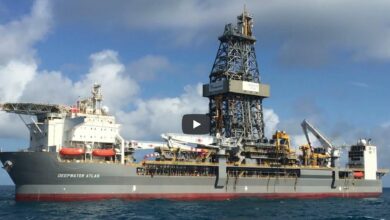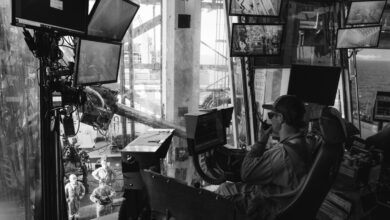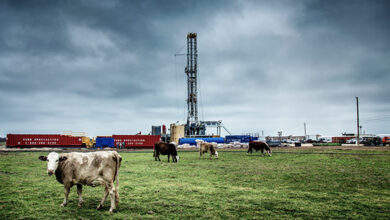Plenary: Collaboration is essential to drive sustainable performance improvements
By Linda Hsieh, Managing Editor

The need for more effective collaboration among operators, drilling contractors and service companies emerged as a key theme during the plenary session at the 2015 SPE/IADC Drilling Conference on 18 March in London. Industry leaders representing BP, KCA Deutag, Schlumberger, Shell and Statoil also highlighted the critical need to drive continuous performance improvements – a need that the panelists said exists irrespective of oil prices. “Some of the good conversations I’m having with our service companies and drilling contractors right now is saying, ‘Actually, this isn’t about the oil price.’ The things we’re talking about (to improve performance) hold good for $50, hold good for $100,” Gary Jones, Head of BP’s Global Wells Organization, said.
Mr Jones was joined on the panel by Steve Kaufmann, President of Schlumberger Drilling & Measurements; Arne Lyngholm, Statoil Chief Engineer of Drilling Technology; Ivan Tan, Shell VP of Wells and HSE; and Jack Winton, President of KCA Deutag’s Operations Division. Eithne Treanor, MD of E Treanor Media, served as moderator for the session, which was conducted in a townhall meeting style.
The panel recognized the vital role that technical innovations – in everything from MPD to rotary steerables to integrated workflows – have played in pushing performance to where it is now. In the Gulf of Mexico subsalt, for example, Mr Kaufmann said that drilling time has decreased from 10 days/1,000 ft to 1 day/1,000 ft over the past decade. “We’ve seen significant improvements in drilling performance as a result of technology application. Now, as we go into the world that we’re in today, the onus is on us – as an industry – to ensure that we keep the focused approach on applying technology smartly,” Mr Kaufmann said.
To facilitate the technology uptake process, however, being able to quantify value will be an essential driver. Simply pushing technology from the research side is not going to be enough; a business need must be demonstrated. “When we are looking at new technology, technology development, technology piloting and technology implementation – if there is a strong need from the business, there are no obstacles,” Mr Lyngholm said. “But I can tell you there are quite many obstacles if you don’t have that passion from the business side.”
Throughout the discussion, the panel did not shy away from recognizing the economic difficulties that all oil and gas companies face today. Capital budgets are being cut across the board; inevitably, this means that unit costs will have to come down. Yet, at the same time, operators realize they must take a long-term view of E&P activities – some deepwater fields being developed today may not come on-stream for 10 more years.
“What we need to do is to look at doing things more effectively,” Mr Jones said. “From the oil company’s perspective, it’s not in our interest at all to cut the margins of our contractors or suppliers because, if they do that, it means they won’t be able to train their people and they won’t be able to bring the technology that we need. We won’t get a sustainable future.”
Compared with the 2008/2009 downturn, Mr Jones said, industry players are working together better this time to communicate objectives and find alternative solutions. “Clearly we need some relief on unit cost – but also where are the inefficiencies and where are the performance opportunities where we can bring down the overall cost of drilling these wells. I honestly believe that if we do that, we’ll get to a place where the margins can increase, the costs come down, and we can deliver these reserves.”
Another form of collaboration may emerge through risk sharing, Shell’s Mr Tan said. Instead of continuing with current contractual agreements where operators shoulder the bulk of the risk, he said, the industry should look at models that better align the motivations of both the oil company and the service company. Incentivization schemes, for example, could bring both parties an upside if a project goes well but spread the risk around if things don’t go as planned. “It’s about finding where that starting point for a discussion is,” he said.
“I really believe that we’re at a stage where we can do something to really make a change that’s sustainable,” Mr Tan continued. “What we don’t want to do is for the oil price to go back up in 18 or 36 months, then we forget all that we discussed and we’re back to doing business as usual again.”
Regardless of the economic situation and any alternative contractual models that may emerge, however, panelists agreed that HSE will remain a core value – no matter how the market changes. Mr Winton said the industry strongly recognizes that the protection of employees and the environment is a moral imperative. “We can’t let any of the cost pressures we’re all under at the moment have any effect on that,” he said.




